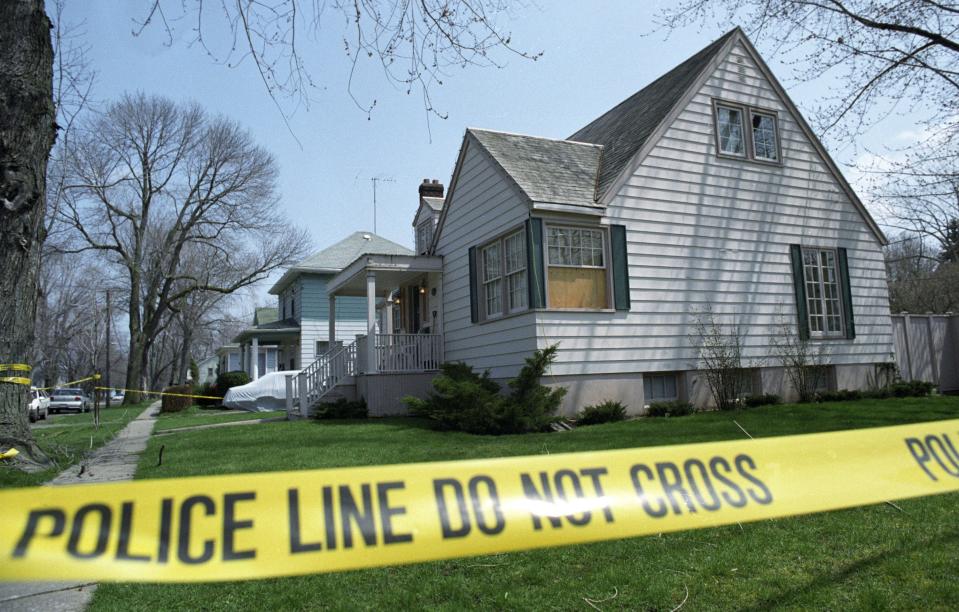What your real estate agent has to tell you about your home's past

Just over 22 years ago, Paul Bernardo was convicted of the kidnap, rape and murder of teenagers Kristen French and Leslie Mahaffy.
Those horrific crimes took place in a small pink home on 57 Bayview Drive, in St. Catharines, Ont.
Later, the house was purchased by the city and demolished.
But it wasn’t long before a new home was built on the site with a new number (the street addresses now jump from 55 to 61).
While the new owners are likely aware of the site’s dark history, there are many more homes were less headline-grabbing events take place. Do real estate agents have to let buyers know if a property has a checkered past, whether it’s a murder, suicide, marijuana grow-op, meth lab or even supposedly haunted?
Toronto real estate lawyer Bob Aaron told Yahoo Canada Finance that real estate regulators across the country, such as the Real Estate Council of Ontario (RECO) , require agents to disclose any material facts that could possibly be relevant to a buyer’s decision to purchase a property.
In the case of the RECO, that means a member must “discover and verify the pertinent facts relating to the property and the transaction.”
Aaron said that should an agent fail to disclose this type of information, they could get their “knuckles rapped” by provincial regulators for misleading a buyer or not being aware of relevant facts.
However, he has indicated in the past that agents aren’t obligated to reveal something that is “beyond” their knowledge. In fact, Quebec is the only province that has laws that require disclosure of a property stigma.
And with issues related to psychological stigma, it is often hard for agents to uncover.
“It’s not always easy to find out if there was a murder or suicide or if the house was haunted,” said Aaron.
“There’s no way to tell and press reports do not usually put an address,” he added, noting that real estate agents also wouldn’t be briefed on home’s background.
That means owners could be in a position where they try to sell the home, 10 years after purchasing it, and a new buyer uncovers its dark past.
“Someone says, I googled this address and it turns out there was murder here,'” he said.
“And then you can’t sell it, or you can’t sell it for what you paid for it, or what you want to get for it.”
Stigma is also subjective.
Aaron said he had a client who was purchasing a condo in downtown Toronto and the offer said the vendor — in this case the estate — discloses that the owner died in the unit. However, that line was crossed out by hand and it was written in that the vendor was murdered in the condo.
“I said to my client, ‘This would freak me out. Does it bother you?” Aaron recalled.
“And he said, ‘Naw. I don’t care.”
While grow-ups have more evidence, there are still cases of buyers not being informed about the previous uses of their new homes.
On Monday, an Ontario woman revealed that she was facing estimated clean-up costs between $25,000 and $100,000 after moving into her new home and finding out there had been a drug bust just one year ago.
She’s now suing the home’s seller and the inspector she used.
Aaron said when this occurs, it’s often the case of an inexperienced real estate agent, while a veteran agent is more likely to recognize the signs of a grow-op.
What can you do about it?
When looking for evidence of a grow-op, Aaron said there are a number of telltale signs, including:
Evidence of tampering with the electrical panel and meter
Mould in areas where you wouldn’t normally find it, such as where walls and ceilings meet
Holes in the ceiling or roof that were used to ventilate humidity related to the production of marijuana
Alterations to a fireplace
Concrete masonry patches
Unusual wiring
Marks on a basement floor
Denting on the front door from police entering forcibly
Fresh paint on window frames to hide damage from humidity
“I’ve had clients walk through homes and report to me, ‘Why am I getting this at such a cheap price?’ And I say, ‘Tell me about the house.’ And they give me descriptions of things that are obviously grow-ops, or a remediated grow-op,” said Aaron.
You may also be able to track down a home’s history in an online database, such as Home Verified.
As for other issues relating to a home’s past, Aaron recommended that buyers put a clause in their offer that stipulates there are no psychological issues, such as murders or suicides.
But ultimately, Aaron said if there are outward indicators of issues, real estate agents should disclose them before there is a firm offer on the table.
“The smart agent will do it upfront so that they’re not wasting time on someone who’s freaked out by rumours of ghosts,” he said.
Download the Yahoo Finance app, available for Apple and Android.

 Yahoo Finance
Yahoo Finance 
